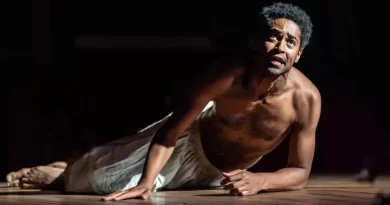“Medea” at Teatro Franco Parenti, Milan
Maggie Rose in Lombardy
31 May 2023
The Pathological Theatre’s Medea, directed and adapted by Dario D’Ambrosi, has been performed at Milan’s Teatro Franco Parenti.
This Italian company, founded by D’Ambrosi, a well-known film and television actor and the recipient of numerous awards both in Italy and abroad, is unusual on several counts. Firstly it tours worldwide, and in recent years this Medea has visited London, New York and Los Angeles.
The adaptation itself is also atypical, if one considers recent productions of this classical play, where director-adaptors reimagine it in a contemporary setting, often in very different cultures from the original (see Robert Schneider’s review of Luis Alfarro’s Mojada’s A Medea in Los Angeles and of Kate Snodgrass’s The Art of Burning elsewhere on this website.
Another recent production, Simon Stone’s Medea at Amsterdam’s Internationaal Theater, sets the play in contemporary American society, in order to reference the real-life case of Deborah Green, a Kansas physician, who spurred on by her husband’s infidelity, poisoned him and killed two of her children. The overriding wish of these adapters and directors seems to be to ‘presentify’ Euripides’ tragedy, revealing perhaps the conviction, on their part, that the play is unable to communicate with contemporary audiences.
Instead D’Ambrosi (as director and adapter) has decided to leave Medea in its original time and place in a linguistic mix of modern Italian and Attic Greek, with the result that it resonates powerfully through the ages. He also adopts simple staging techniques: sheets draped on poles to delineate the acting area, the chorus dressed in the simplest of white robes, the same poles reused by the chorus to give pace and rhythm to the action together with the mesmerizing music of a percussionist.
There is a backcloth that allows the murder of Medea’s children to be performed as a shadow play. D’Ambrosi’s focus is definitely on his actors. Medea (played by a magnificent Almerica Schiavo) dominates the stage with a dark velvet (richly embroidered) dress and headdress making her stand out from the rest of the cast. She holds our attention, as her mood constantly swings, sometimes coming over as strong determined and vengeful when dealing with her husband Jason’s infidelity, at others, looking fragile, helpless, even sweet, as if the events unfolding in this fiercely patriarchal society are just too much for her.
Still she slowly moves towards the final act of killing her two children, psychologically alone in her status as an exile far from her homeland and physically alone since Jason’s attentions are focused solely on his new love.
Finally, D’Ambrosi’s Pathological Company is unusual for another reason: it combines a nucleus of professional actors with a chorus of differently-abled people (some of whom have neurological disabilities and Down syndrome). Having been trained at a drama academy that D’Ambrosi steers in Rome and after selection to perform with the company, this second group enjoy a role in society that they might usually be denied. This shines through in the absolute precision of their movements and gestures, their remarkably variegated facial expressions, revealing their reactions to and emotional involvement in Medea’s plight throughout the performance.
.
.
~









